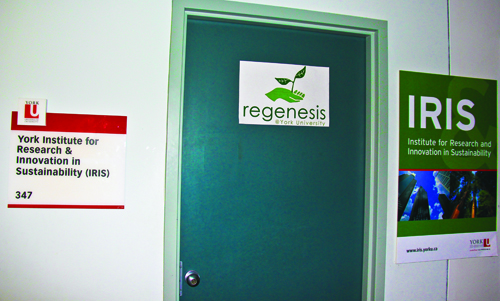Members and supporters of the Institute for Research in Sustainability at York were surprised to learn in April that the institute would not be considered for recharter.
On its website, IRIS describes itself as a “university-wide interdisciplinary research centre dedicated to pursuing multifaceted approaches to the contemporary challenges of sustainability.”
Robert Haché, vice-president research & innovation, says of the 12 organized research units that submitted charter applications, IRIS was the only one not recommended to Senate, which is responsible for approving these applications.
He says, based on an external review report in 2014, comments from the board for ORUs, and comments from the strategic projects and opportunities review team, it was clear there were challenges with the application.
He notes in order to be considered for recharter, ORUs must each submit a strategic vision document. This document is designed to provide a vision for the ORU.
He says the external reviewers essentially noted that it wasn’t clear to them what additional value IRIS was adding, because the institute hadn’t articulated a clear plan. He says this was the biggest challenge.
He further says the amount of research being conducted at IRIS had declined over the last charter period, and research funding had also declined.
Annette Dubreuil, IRIS coordinator, says this may be true, but points to several research grants that would not have been possible without IRIS.
[su_quote]Dubreuil says, “To see that research was not recognized by the VPRI is embarrassing and insulting.”[/su_quote]
Members of IRIS have expressed concerns that the rechartering process was “untransparent,” leading to Haché’s decision to not recommend the recharter of IRIS.
Dubreuil says over 100 supporters had signed on to the 2013 rechartering application to “save the centre.”
She mentions there seemed to be hostility towards IRIS, and refers to “conversations” held between the VPRI and various faculty members that IRIS was not part of.
She alleges IRIS was not given proper notice for the submission of the application, but Haché notes the information was sent out in April 2013.
Haché says had the committee known of the questions IRIS had, every effort would have been made to provide more information.
Dawn Bazely, former director of IRIS, states the institute had been asking questions since April 2013 and insists the VPRI provided vague responses to these questions and confused the process with “flip-flops.”
Haché says, “the reviewers recognize [IRIS has] done a lot of good things over the 10 years, and that’s terrific, but the focus really is on proposing what they plan to do over the next five.”
Bazely, however, says, “I have never been asked in any detail about the proposed five-year research plan we submitted.”
Haché believes every effort was made to communicate with the ORUs, and says these efforts succeeded with the 11 applicants that were recommended for chartering.
Haché notes that he realizes IRIS is not pleased with this, as “they would very much like to continue,” but he does say this is not necessarily the end of the road for IRIS.
He notes IRIS will lose its status as an ORU July 1, 2014 and the support that comes with it.
The institute, however, will be able to keep its name and space for a year, with the current charter expiring June 30, 2014, and will be eligible to submit another application this fall.
Ashley Glovasky
News Editor
Image source: Kinga Szymczyk
Rechartering of York sustainability institute not recommended to Senate



